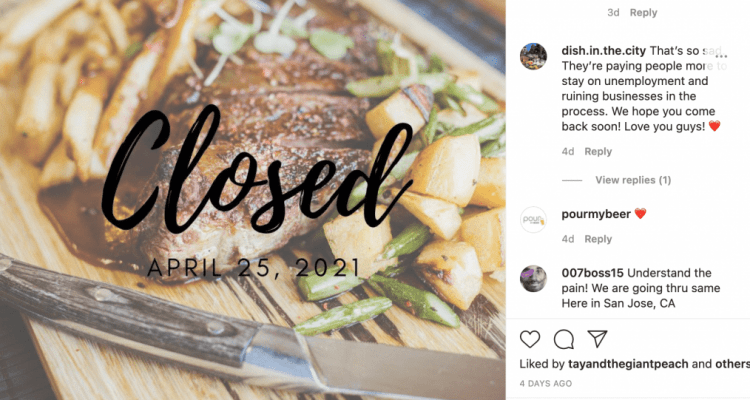In March of 2020, when Governor Jared Polis announced he was suspending in-restaurant dining — a dire consequence of COVID-19 — Juan Padró, whose portfolio of full-service restaurants and bars includes Bar Dough, Mister Oso, Forget Me Not, Señor Bear and more than a dozen others, made a concerted effort to retain his staff, empowering them to take on new responsibilities: community outreach, mental health advocacy and policy drafting, just to name a few. And most of his staff — around 90 percent — continued to work with Padró throughout the pandemic. But he still has plenty of positions to fill. The problem? A pervasive worker shortage in Colorado’s hospitality industry.
“Max lined up 10 interviews, and not one person showed up. None. Nada. Zero.”
Juan Padró

“The industry has had staffing problems for a long time, but nothing like this,” laments Padró, who points to a recent situation in which Max MacKissock, a partner in Bar Dough and the culinary director of Culinary Creative, Padro’s restaurant group, recently posted an ad for a dishwasher. “Max lined up 10 interviews, and not one person showed up. None. Nada. Zero.”
The primary reason for “no-shows,” theorizes Padró, can be summed up in two words: unemployment benefits. More pointedly, insists Padró, it’s fraud. “The reality is that there’s a lot of fraud; it’s going through the roof,” he says. And the prevalence of “no-shows,” he adds, is a common occurrence. “It happens all the time. People are filling out applications to show proof that they’ve applied for a job, but then they simply don’t show up for the interview, mostly because they can make a lot more money from unemployment benefits.”
Padró isn’t alone. Many restaurant owners have suggested that the weekly $300 federal pandemic unemployment benefits the Biden administration extended through September 6 of this year, coupled with weekly state aid, is keeping a massive number of hospitality employees from returning to the workforce. “How can you tell someone to come back to work for $800 a week when they can make equal to or more on unemployment?” wonders Padro. Be that as it may, says Padró, “It’s not cool if you’re capable of working and you’re just staying home.”
Mark Whistler, owner of Route 40 Cafe, echoes Padró’s sentiments. “I called a bunch of my old staff to see if they wanted to come back to the restaurant, and while they can certainly work, they’re collecting unemployment instead. It’s infuriating. They’re practicing yoga, walking in the park and taking vacations. That’s called retirement.”
In early April, Whistler received around 250 applications for various jobs at his four-and-a-half-year-old Congress Park restaurant. He called every single applicant, devoting hours upon hours of his time to give jobseekers an opportunity to return to the workforce. Of the 250 calls he made, only 200 were working numbers. A mere 75 people spoke to Whistler on the phone and exactly fourteen met him face-to-face for an interview. Fourteen people from an original pool of 250. And nearly half who did show up weren’t exactly enthusiastic. “I heard so many ultimatums,” recalls Whistler: “I may or may not want to work on weekends;” I don’t like to get up early”; “I don’t want to work too late.” And then there were those who trashed their former bosses or workplaces, which resulted in a hard “no” from Whistler.
Still, Whistler hired eight of the fourteen applicants he interviewed, and he believes those new employees are legitimate professionals who are 100 percent on board. “The magic,” he says, “is the people who I hired really want to work. They’re high-quality professionals who have proven that they have a solid work ethic, and because of that, those people will have better opportunities on my team.”
But is all the talk about employees refusing to return to work because of unemployment benefits really this cut-and-dry?
“At the height of the pandemic, the state’s restaurant industry shed 94,000 jobs, and due to the Level Red restrictions this past winter, many of those people were either laid off or furloughed for a second time through no fault of their own, which created an understandable sense of insecurity across the industry,” explains Sonia Riggs, president and CEO of the Colorado Restaurant Association, a trade organization that represents the state’s foodservice industry and has played a monumental role in keeping its members updated on COVID-19 restrictions, vaccination clinics, mental health resources and more.
It’s important to understand, too, adds Riggs, that “before vaccinations were available, it may have made more sense from an employee perspective to remain home, out of public-facing work, and collect unemployment benefits.” Furthermore, says Riggs, “Wages are rising across the state and capacity limits are easing, which makes it easier for workers to earn money, so it’s no longer accurate to say that restaurant workers can make more money by remaining on unemployment.”
But for one former server, remaining on unemployment is far preferable to returning to the restaurant arena. Sara, who requested we not use her last name, worked in the hospitality industry for more than two decades before losing her job in March of 2020. She describes herself as “100 percent capable of working, healthy and college-educated,” but Sara is willfully unemployed. And, she says, the amount of her unemployment benefits, which she estimates are between $25,000-$27,000 a year, amount to more than she made while she was a full-time worker. “I’m making more money on unemployment than when I was employed, so there’s no need for me to return to work,” says Sara. “I’m being paid enough to cover my rent and my bills, and I can finally go to the grocery store and afford good, clean food.” For the first time ever, she insists, “I’m financially comfortable.”
Sara’s rationale for collecting unemployment benefits is a direct result, she says, of employers who don’t support paying their employees a living wage. “I need to be paid a reasonable wage — a living wage — and that’s not the case. It doesn’t make sense that I’m getting paid more to sit on my ass than to work,” she explains.
According to Riggs, however, restaurants are “offering signing bonuses, bonuses for achieving time-related milestones at work and higher wages across the board.” As well, says Riggs, “Many restaurants are exploring tip-pooling models to offset disparities between front-of-house and back-of-house workers and offering health insurance, paid-time-off benefits and mental health services.” As for wages, they’re up, too, according to results from a recent Colorado Restaurant Association Impact Survey, which records responses from its member restaurants. “Our January 2021 Impact Survey respondents reported that front-of-house workers were earning, on average, $27 an hour, while back-of-the-house workers were earning, on average, $17 per hour,” notes Riggs.
“I could die tomorrow. I don’t save money; it’s not how I choose to live my life.” Instead, says Sara, “I’m the kind of person who flies by the seat of my pants.”
But Sara, whose unemployment benefits have also allowed her to “travel to Mexico, eat out a lot and just relax at home,” has no intention of applying for a restaurant job — or any job — for the next several months. Come September 6, however, Sara’s extended unemployment benefits will likely come to a screeching halt. And then what? “I’d love to be a teacher, but I don’t want to struggle financially, so I really have no idea what I’m going to do at that point,” admits Sara, who hasn’t saved a dime. “I could die tomorrow. I don’t save money; it’s not how I choose to live my life.” Instead, says Sara, “I’m the kind of person who flies by the seat of my pants.”
For restaurateurs like Padró and Whistler, that mindset doesn’t fly. “At some point, there’s going to be a ‘come-to-Jesus’ moment when those people are going to have to work again,” says Whistler, cautioning that when unemployment benefits cease and he’s bombarded with an onslaught of applications and resumes, he’s “not going to hire those people.” If you’re healthy, capable of working and vaccinated and still collecting unemployment, “I don’t want you on my team,” he warns.
Padró agrees: “When unemployment runs out and there’s a rush of people trying to get back into the workforce, it becomes a character issue for me, and if I’m interviewing someone who tells me they couldn’t find a job, they’re lying, and I don’t want them.”
Even with that caveat, the availability of positions amounts to an embarrassment of riches.
Despite Colorado’s 6.4 percent unemployment rate — the 34th highest in the nation — staffing shortages continue to plague restaurant operators. Beasts & Brews, a restaurant and taproom in Colorado Springs, recently went dark for an entire Sunday because of “a severe staffing shortage.” Other restaurants have sharply reduced their operating hours or closed early because of the unprecedented labor shortage. And with summertime just around the corner, the easing of mask-wearing in outdoor spaces and 31 percent of Coloradans fully vaccinated (as of May 2), restaurants are beyond desperate to feed us. “There’s an incredible opportunity right now for hospitality-minded workers to join the restaurant industry,” says Riggs. “It’s a vibrant and community-oriented industry that, before the pandemic, employed 10 percent of Colorado’s workforce.” — Lori Midson




I am the owner of Colorado Catering Company. I am struggling with hiring staff as well. While I am an owner I have also been a struggling line cook before. It’s a shame that the pay is so low for kitchen staff. This industry is off balance. Customers are not willing to pay more for diner. They think paying uber eats to have local food deliver to them is a good thing. By doing this you don’t pay the server and a lot of that money goes to uber eats.